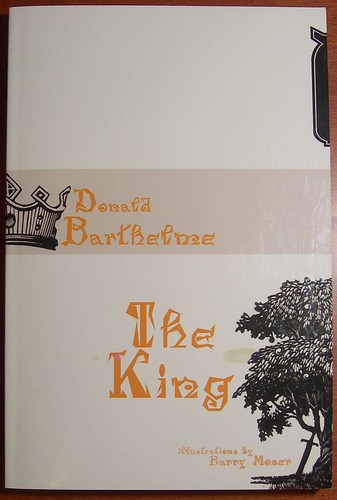by Donald Barthelme (1990)
158pp
I own more Don Barthelme and John Barth than I know what to do with. This is partly my fault: I am unfortunately tolerant of postmodernism, metafiction, experimental fiction, and the 1960s. This is also the product, however, of this strange phenomenon whereby you can always reliably find Barth & Barthelme paperbacks at pretty much every used bookstore I've ever been to. Generally, they are falling apart, but they'll only cost you a dollar & they tend to have pleasingly kitschy cover art. Consequently, I have around 3000 pages of (oh wow, good guess: the exact figure comes to 2989) Barth & Barthelme on my bookshelves. (And I don't even own The Sot-Weed Factor!) If this narrow band of the alphabet were representative of my entire book collection, my fiction shelves alone would have literally miles of books. (Side note. Total number of pages of Frederick Barthelme on my shelves: 0.00)
So when I picked up this Barthelme I knew that I had enjoyed his work in the past, and could reasonably anticipate what I was getting into. Ironic, since it was Barthelme's originality that initially drew me to him. Now that he's become familiar, I choose to read him because I know it'll always be an easy, though smart & entertaining, read. When I chose this particular book, I hoped to jump-start an interest in Arthurian Grail Lore that might lead me to read the copy of From Ritual to Romance that I bought a few months back.
Which brings me to this book: it's a reimagining of Arthurian Grail Lore in the context of World War II. Most assuredly, plot is not Barthelme's strength. The characters, and their basic story arcs are of course familiar, being borrowed outright from Malory. And the WWII "twist": the Grail = the atom bomb, which Arthur rejects as "not a knightly weapon." Having thus considered and yawned at the book's plot, we now consider technique, which is why you read Barthelme in the first place.
Like a lot of Barthelme, the story is told almost entirely through dialogue. The book, essentially, is a collection of dialogues interspersed with occasional sentence fragments establishing location & characters' positions. There are a handful of amusing passages of "action"--mostly clashes between knights--that are told through the artificially narrative and exclamator exchanges of peasant onlookers.
"Sir Belvedere has single-handedly taken an entire battery of 105mm howitzers! The captured gunners line up with their hands behind their heads!"
"O noble Sir Belvdere! Sir Ironside is lashing with his ancient blade as one enchafed by a fiend!"
"But Mordred, too, is doing mighty deeds! He fights extremely well for a traitorous poltroon!"
So it's amusing, in an intelligent way, which is Barthelme at his best. Incidentally, he does his best in short fiction, which he seems to know. Any Barthelme "novel" I've ever read has been a collection of dialogue-driven two- or three-page "chapters." The King, though, works better than Snow White or The Dead Father.

This edition was published by "Dalkey Archive Press," who I first encountered when I read The Dalkey Archive itself. Thus far, I'm pleased with that publisher's selection of titles.

No comments:
Post a Comment